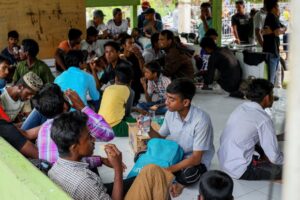Banda Aceh, Indonesia
2022-03-07

Indonesian authorities are investigating the possible role of a people smuggling ring in the weekend arrival of 114 Rohingya in the Aceh region after 25 days at sea, a police spokesman said Monday.
Villagers in coastal Bireuen regency saw the group of 58 men, 21 women and 35 children disembark from a rickety wooden boat and helped them find shelter in the early hours of Sunday, police and officials said.
The Rohingya were later moved to a neighborhood mosque, where they were given food and underwent medical checkups and tests.
“We are investigating [possible people smuggling] and are still collecting information from witnesses and evidence,” said Senior Commissioner Winardy, a spokesman for Aceh police.
The group was the second to arrive in this area since Dec. 27 when local fishermen rescued 120 Rohingya, including 51 children, off North Aceh after their boat’s engine failed.
The Bireuen administration has provided food for this latest group of Rohingya, while locals set up a kitchen at the mosque where the Rohingya were staying, said a local community leader, Muslim A. Majid. He said the Rohingya were spotted by locals who were looking for crabs near the beach.
“When we found them, they had got off the boat and were sitting in the quiet part of the beach,” he told BenarNews.
Winardy, the police spokesman, said the Rohingya spent more than three weeks at sea with little food.
“We found that 74 of them had UNHCR cards, and 30 people had [COVID-19] vaccine cards,” he said, referring to the United Nations refugee agency.
A spokeswoman for UNHCR, Mitra Suryono, said it was not immediately clear where the Rohingya were traveling from or where they were headed.
“Right now, our focus is their health. They have undergone COVID tests and will have a period of quarantine,” she said.
As with previous arrivals, “there were some who already had cards issued by the UNHCR in Bangladesh, because they had previously fled there and were registered as refugees there,” she said.
Since Burmese security forces launched a brutal crackdown in Myanmar’s Rakhine state against the Rohingya in 2017, refugees have paid traffickers to transport them to Thailand and Malaysia. The Rohingya hope to find work away from Myanmar or crowded refugee camps in neighboring Bangladesh.
Since the 2017 crackdown, about 740,000 Rohingya who fled Myanmar settled in camps in and around Bangladesh’s Cox’s Bazar, now home to about 1 million of the refugees. Over the years, groups of Rohingya have packed into boats and sailed off in search of asylum in other countries, but have often been refused entry.
A young refugee in the batch of new arrivals said he had left his mother behind at a refugee camp in Bangladesh and followed his uncle to start a new life, preferably in a majority-Muslim country such as Indonesia or Malaysia.
“We left Bangladesh because the Rohingya situation at the camp is not good, it’s getting very bad at the moment,” 11-year-old Omar Faruk told an AFP journalist on Sunday in English, adding that his group had been at sea for 25 days.
“We left Bangladesh to this country to make a beautiful future … I have no father, only one uncle and my mum is still in Bangladesh,” he said. “I came here because I want to improve my education.”
Muzakkar A. Gani, the chief of Bireuen regency, said he hoped that the Rohingya would be transferred to the city of Lhokseumawe in North Aceh regency under the supervision of the International Organization for Migration and UNHCR.
“The temporary shelter in Bireuen is not secure enough and there are concerns that the refugees will flee,” Muzakar told reporters.
At least 36 of the 120 Rohingya who arrived in December have fled their Lhokseumawe camp, prompting concerns that a human trafficking ring had smuggled them out of Indonesia, Muzakar said.
“I don’t have evidence yet, but this appears to be systematic, so there is a strong suspicion that other parties are involved,” Muzakar said.
Local officials said they did not know exactly where the Rohingya had gone to, but suspect they had been taken to Malaysia, their original destination.
As of October, at least 665 Rohingya have ended up stranded in Indonesia on their way to third countries including Malaysia and Australia, according to UNHCR.
Indonesia is not a party to the U.N.’s 1951 Refugee Convention or its 1967 Protocol Relating to the Status of Refugees. It prohibits refugees from obtaining jobs and attending formal schools.
